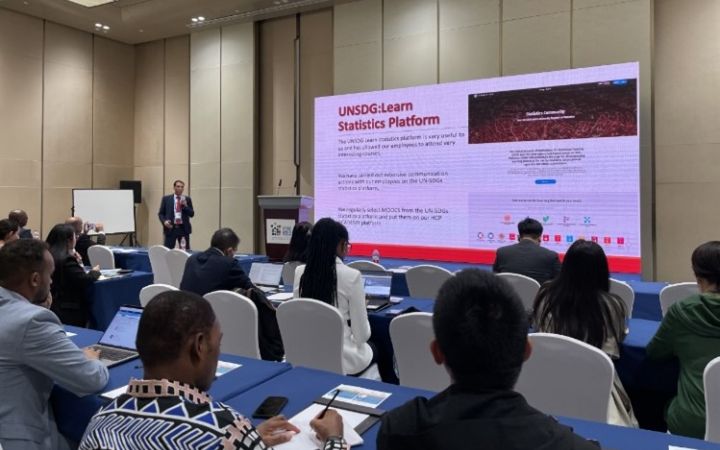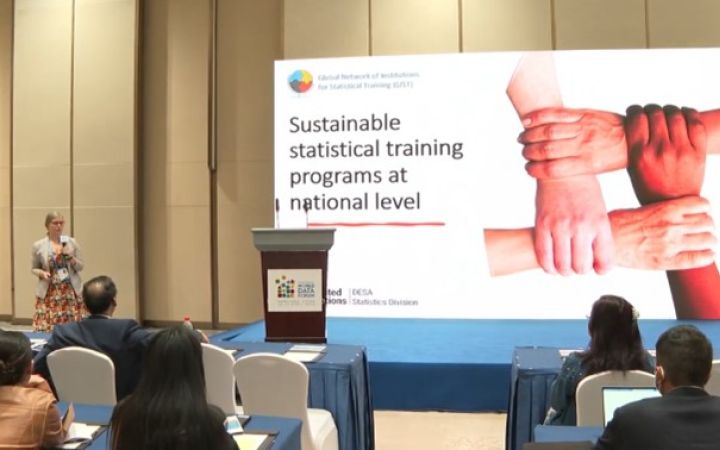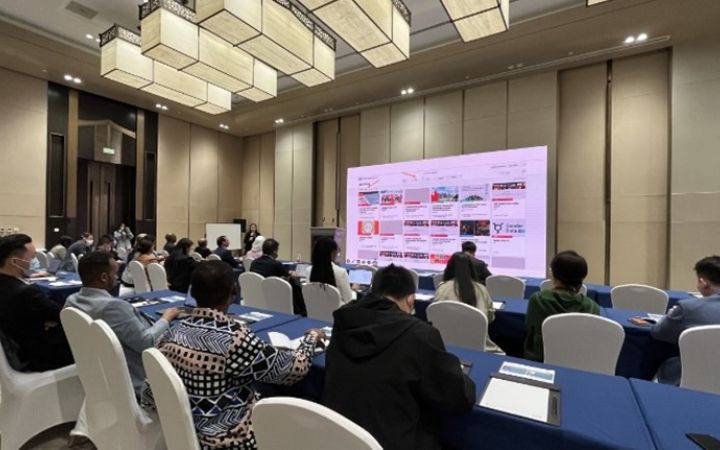26 April 2023, Hangzhou, China. Tremendous amounts of data generated every day represent significant opportunities for National Statistical Systems (NSS) to improve the timeliness, granularity and quality of information about our societies. Yet, many NSOs, particularly in developing countries, struggle to ensure they have sufficient staff with relevant competencies to harness these opportunities or at times even to produce basic statistics. Building sustainable statistical programs at the national level can help strengthen the capacities of staff of the NSOs and NSS over the short, medium and long term to achieve their priorities. This is also crucial for ensuring consistency and effectiveness in human resource investments, and can draw on a mix of globally available e-learning and nationally tailored training solutions. Finding relevant e-learning, however, may not always be easy due to a multitude of providers.
Recognizing this challenge, the Global Network of Institutions for Statistical Training (GIST) and UNITAR organized a learning session entitled “(LEARN.318) Learning and teaching official statistics with the help of UN SDG:Learn” on 26 April 2023 as part of the 2023 World Data Forum (2023 WDF) held in Hangzhou, China.
Since 2020, the UNSDG:Learn Statistics gateway has been providing a one-stop-shop for learning and training on official statistics from GIST members and other organizations. In addition, the Inter-Agency Expert Group on SDG indicators (IAEG-SDGs) decided in 2022 that the UN SDG:Learn Statistics platform should be a go-to place for all training and learning on SDG indicators from custodian agencies and other organizations. There are examples of countries that have been leveraging UNSDG:Learn already to ensure sustainable access to relevant statistical training for their staff.
One of the examples of countries that have deployed comprehensive statistical training is Morocco. Mr. Samir ISSARA, Director of Human Resources and General Affairs, High Commission for Planning of Morocco (HCP), explained how they use the UN SDG:Learn Statistics to complement national statistical training offering for Morocco’s NSO. This was done as HCP looked to bridge the training gap in the area of statistics and data collection relevant for monitoring of national priorities and SDGs. More specifically, HCP mapped relevant learning on the UN SDG:Learn Statistics and then featured it on the HCP Academy platform alongside MOOCs, webinars, learning videos and face-to-face training from HCP and other providers. This way HCP was able to have all learning in one place, monitor the progress of employees and provide a personalized training path according to the employees’ needs and functions. HCP is also interested in diversifying the language options, particularly, providing more learning in French and Arabic. As an active GIST Stakeholder Advisory Group member, Morocco has asked GIST to also look into options for translating more materials and has agreed to contribute to the work of the new language group set up by GIST.
“There are a lot of innovation needs and requirements on the official statistics production. To meet this need, how do we empower people to have knowledge and skills to do so? With GIST, we want to help NSOs and NSSs that do not have those elements in place and be strategic on what they can do.” – Ms. Vibeke Nielsen, UNSD.
E-learning is just one possible input into sustainable national statistical training programs which are the focus of a dedicated GIST Task Team. Ms. Vibeke Nielsen, Inter-Regional Adviser on Statistical Training and Capacity Building, UN Statistics Division, provided an overview of GIST’s work over the past 2 years in this area. More specifically, a study conducted by GIST has shown great diversity across the 15 participating countries when it comes to statistical training. Some countries have well-developed statistical training programmes such as Morocco, while others have less structured programs, lack strategic approach to training their staff or don’t have any regular training programmes at all. In response to these needs, GIST has created a toolkit for promoting sustainable statistical training programmes. The toolkit consists of 3 questionnaires and a guidance document to enable NSSs to assess their statistical needs and gaps, prioritize them, and identify ways of addressing them. The toolkit is currently being tested in several countries. Ms. Nielsen stressed the need to think about how NSOs and NSSs can leverage the existing e-learning by combining it, for example, with discussion groups, and lectures around issues that require contextualization. Another aspect to consider is how NSOs can partner with other organizations such as academia who can provide relevant training for statistics production.
To help the learning session participants better familiarize themselves with the UN SDG:Learn Statistics gateway, a quick demo has been made by Ms. Madina Imaralieva, Associate Programme Officer, UNITAR. The platform allows search by keywords, area of statistical activity, SDG or type of learning. 44 in-person participants attending the session were asked to check out and explore the platform in real-time during the session to see if they found the relevant learning for themselves.
During the final part of the session moderated by Ms. Elena Proden, Senior Specialist, UNITAR and current Chair of GIST, participants expressed the need to offer more learning opportunities for the government and other stakeholders involved in the SDG reporting, as well as media representatives to improve their knowledge of statistical methods. Presenters noted that UN SDG:Learn Statistics provides learning not only for the statisticians, but also for other target audiences. UNITAR–UNSD–UNECA MOOC on Understanding data and statistics better for more effective SDG decision-making offers learning specifically for policymakers while other courses can be followed by both statisticians and non-statisticians. One example is UNEP-UNSIAP-UNITAR course on Environmental SDG indicators which is not too technical and can be followed by policymakers interested in learning how to track progress on relevant indicators. The resources are open to everyone and free to access.
To watch the recording the of session, please proceed to the Whova platform of WDF or watch below.




